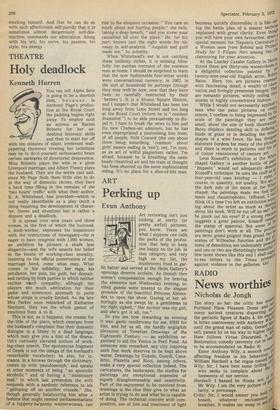THEATRE
Holy deadlock
Kenneth Hurren
You can tell Alpha Beta is going to be a shortish item, because in Anthony Page's production at the Royal Court the padding begins right away. To employ such an actress as Rachel Roberts for her undoubted histronic skills and then to start her off with ten minutes of silent, irrelevant wallpapering (however riveting her technique may be to do-it-yourself enthusiasts) bears certain earmarks of directorial desperation. Miss Roberts plays the wife in a glum Liverpool marriage, and Albert Finney plays the husband. They are the entire cast and, since Mr Page finds them little else to do in the way of domestic chores, they have a hard time filling in the remains of the 'two hours' traffic' with what their author, E. A. Whitehead, has provided—which is not really identifiable as a play (such a thing requiring the development of character, theme and situation) but is rather a dispute and a deadlock.
It is spread over nine years and three scenes, in the first of which the husband, a dock-worker, expresses his impatience with the restrictions of monogamy—he is eager to have congress with 1,000 women, an ambition he phrases a shade less elegantly—and the wife asserts her belief in the tenets of working-class morality, insisting on the official preservation of the marriage bond, come what may. What comes is his infidelity, her rage, his petulance, her pain, his guilt, her despair, and ranting by both parties in which neither excites much sympathy, although the players stir much admiration for their game and unreticent approach to parts whose scope is cruelly limited. As the late Mrs Parker once remarked of Katharine Hepburn, they run the whole gamut of emotions from A to B.
This is not, as it happens, the reason for the title of the piece, which emerges from the husband's complaint that their domestic dialogue is a litany in a dead language, which may give you a hint of the dramatist's curiously elevated notions of working-class speech. The eponymous fragment of Greek is not the omega of the husband's remarkable vocabulary; he also, for instance, in a browse through the dictionary, comes up with 'pseudomorph,' and speaks at other moments of being "an apostolic alcoholic" and of having a "missionary zeal," to which last pretension the wife responds with a sardonic reference to his "galloping off on another crusade." She, though generally belabouring him after a fashion that might remind parliamentarians of a tuppeny-ha'penny washerwoman, can rise to the eloquent occasion. "You care so much about not hurting people," she rails, taking a deap breath, "and you strew your casualties all over the place." He, for his part, knows just the right words for his essay in self-analysis. "Anguish and guilt made me," he submits.
When Whitehead's ear is not catching these unlikely riches, it is missing blissfully the puritan restraint of the common man at home. I should be surprised to learn that the now fashionable four-letter words were conversational currency, in 1962, in the sort of household he portrays (though they may well be now, now that they have been so carefully instructed by their ' betters '). It is a Sloane Square illusion, and I suspect that Whitehead has been too long away from Lime Street and too long at the Royal Court (where he is "resident dramatist ") to be able persuasively to dispel it. I hate to break the news to him and his new Chelsea-set admirers, but he has even expropriated a patronising line from, of all people, Noel Coward (the one about there being something 'common' about girls' names ending in 'een'); not, I'm sure, as an act of wilful plagiarism; rather, I'm afraid, because he is breathing the same heady theatrical air and his train of thought has been shunted up the same sophisticated siding. It's no place for a slice-of-life man.










































 Previous page
Previous page